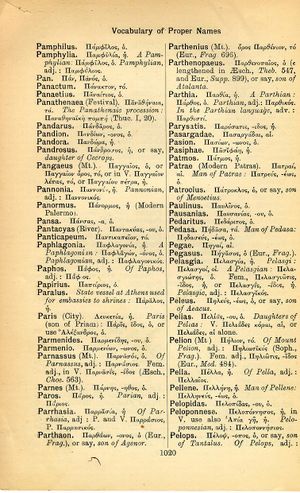Pandion: Difference between revisions
(Names) |
(6_11) |
||
| Line 1: | Line 1: | ||
{{WoodhouseENELnames | {{WoodhouseENELnames | ||
|Text=[[File:woodhouse_1020.jpg|thumb|link={{filepath:woodhouse_1020.jpg}}]]Πανδίων, -ονος, ὁ. | |Text=[[File:woodhouse_1020.jpg|thumb|link={{filepath:woodhouse_1020.jpg}}]]Πανδίων, -ονος, ὁ. | ||
}} | |||
{{Lewis | |||
|lshtext=<b>Pandīon</b>: ŏnis, m., = Πανδίων.<br /><b>I</b> A [[king]] of [[Athens]], [[father]] of [[Progne]] and [[Philomela]], Hyg. Fab. 48; Ov. M. 6, 426; 676: Pandionis [[populus]], i. e. the Athenians, Lucr. 6, 1143: Pandione [[nata]], i. e. [[Progne]], Ov. M. 6, 634.—Transf., for the [[nightingale]], Ov. P. 1, 3, 39: Cecropiae Pandionis arces, Mart. 1, 26, 3.—Hence,<br /> <b>B</b> Pandīŏnĭus, a, um, adj., Pandionian: Pandioniae [[Athenae]], Ov. M. 15, 430: Pandionia [[Orithyia]], the [[sister]] of [[Pandion]], Prop. 1, 20, 31: res Pandioniae, the Athenian [[state]], Claud. IV. Cons. Honor. 506: arces, the [[citadel]] of [[Athens]], id. Rapt. Pros. 2, 19; also called [[mons]], Stat. Th. 2, 720: volucres, the [[nightingale]] and the [[swallow]], Sen. Octav. 8: [[cavea]], the Athenian [[theatre]], Sid. Carm. 23, 137.—<br /><b>II</b> A [[son]] of Jupiter and [[Luna]], Hyg. Fab. praef. | |||
}} | }} | ||
Revision as of 08:11, 13 August 2017
English > Greek (Woodhouse)
Πανδίων, -ονος, ὁ.
Latin > English (Lewis & Short)
Pandīon: ŏnis, m., = Πανδίων.
I A king of Athens, father of Progne and Philomela, Hyg. Fab. 48; Ov. M. 6, 426; 676: Pandionis populus, i. e. the Athenians, Lucr. 6, 1143: Pandione nata, i. e. Progne, Ov. M. 6, 634.—Transf., for the nightingale, Ov. P. 1, 3, 39: Cecropiae Pandionis arces, Mart. 1, 26, 3.—Hence,
B Pandīŏnĭus, a, um, adj., Pandionian: Pandioniae Athenae, Ov. M. 15, 430: Pandionia Orithyia, the sister of Pandion, Prop. 1, 20, 31: res Pandioniae, the Athenian state, Claud. IV. Cons. Honor. 506: arces, the citadel of Athens, id. Rapt. Pros. 2, 19; also called mons, Stat. Th. 2, 720: volucres, the nightingale and the swallow, Sen. Octav. 8: cavea, the Athenian theatre, Sid. Carm. 23, 137.—
II A son of Jupiter and Luna, Hyg. Fab. praef.

